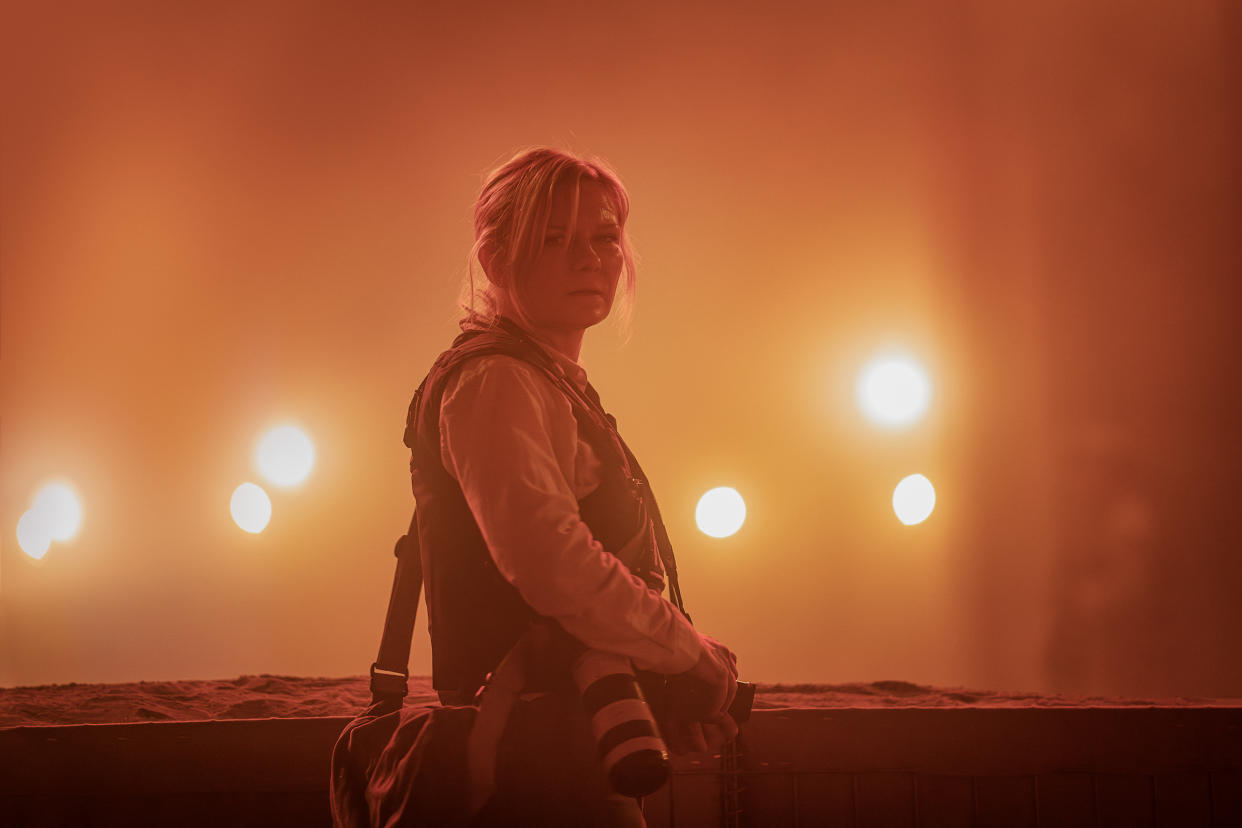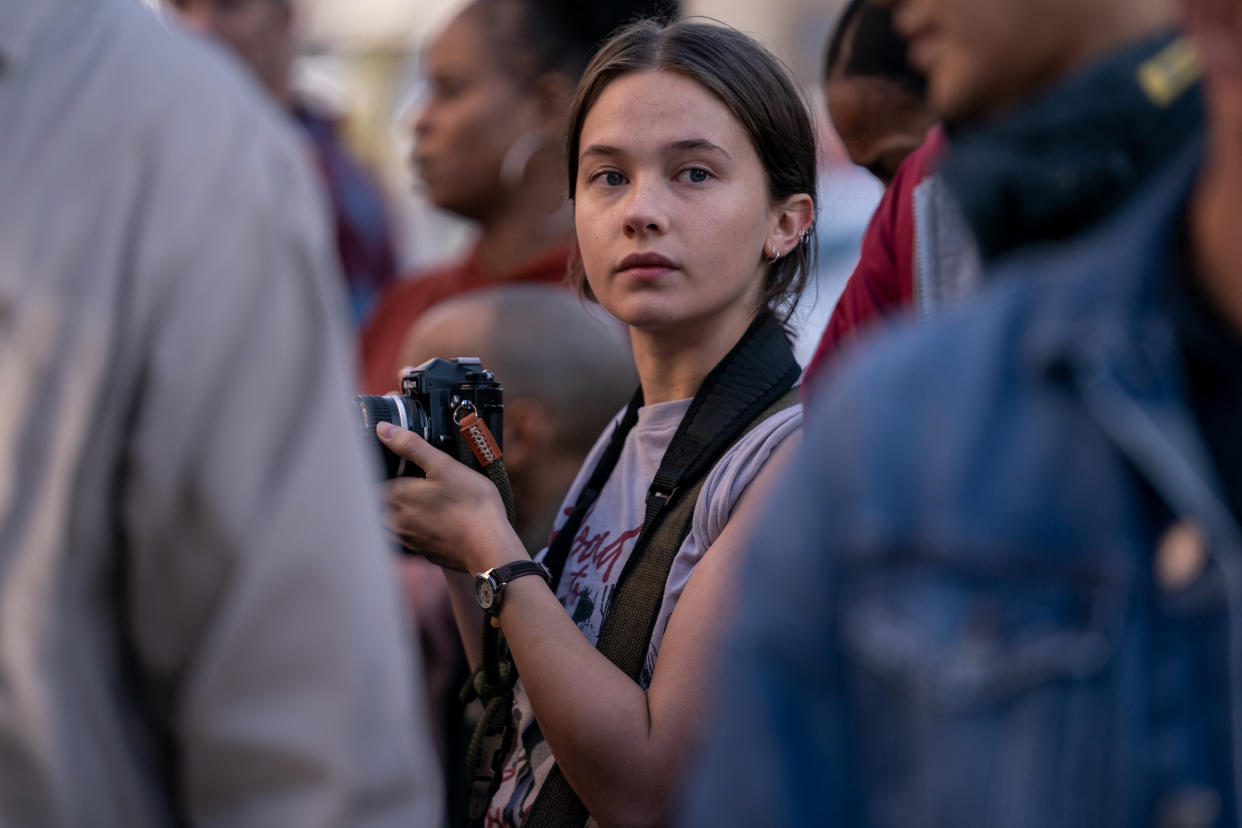Alex Garland's Civil War Works Overtime to Make Its Over-Obvious Points
The country we call the United States is dangerously fractured right now, and anyone who denies it has their head in the sand. That should make Alex Garland’s Civil War the perfect movie for our times. Instead, it’s just the most obvious one. Set in a country torn to ribbons, Garland’s movie is calculated to be powerful, chilling, alarmingly prescient—you can almost see the advertising pull quotes writing themselves. But there’s a difference between a movie with depth and one that pedals hard to convince us how deep it is. That’s the kind of movie Civil War is: one that invents a nightmare-on-earth scenario and takes great pains to portray it as realistically as possible, with the aim of jolting us to attention. The horrors mount—a pit filled with dead bodies, a character executed point-blank for no reason beyond cruelty. And still, somehow, it adds up to so little. We all want movies with vision, but what kind of vision are we willing to settle for, and why?
There are lots of movies about American journalists covering conflicts in other war-torn countries, and Civil War seeks to explode that comfortable idea of "otherness." The movie's novelty is that its main characters, two combat photographers and two (alleged) war correspondents, are running themselves ragged, emotionally and otherwise, to capture some sense of the truth in a war being fought on their own soil. The movie sets up its dystopian futureworld with a handy bit of exposition: an armed alliance of states has launched a revolt against a fascist U.S. government. This internal war has been bloody and devastating, though it may be nearing an end. The President—he’s played, in his two brief scenes, by Nick Offerman—is beleaguered and running scared. Veteran photographer Lee (Kirsten Dunst) and journalist Joel (Wagner Moura), embedded with the rebel military, decide to make the dangerous drive from New York to Washington in time to snag an interview with the President in what they believe will be his last days in office.
Before they can take off, an older journalist, Sammy (Stephen McKinley), unable to walk without the help of a cane, talks them into taking him along. (A line of dialogue indicates that he works for “what’s left of the New York Times,” a not-so-subtle nod to our current crumbling media world.) A callow rookie photographer desperate to become a hotshot, Cailee Spaeny’s Jessie, somehow talks her way into their plan, too. In an early scene, Lee shoves her out of harm’s way, probably saving her life, and Jessie beams gratefully. It turns out that Lee’s last name is Smith. Though nearly everyone in this futurescape hellhole has probably forgotten an earlier photographer named Lee Miller, Jessie, bright as a button, hasn’t. That other Lee, Jessie observes helpfully, “was the first photographer into Dachau,” though of course Lee already knows that. She’s angry that Jessie has been allowed to travel them (it was Joel, hoping to score with this tough cutie-pie ingenue, who made it happen), but she knows she has to make the best of it. She’s been at this gig for a while, and though she still has the drive to do the job, you can see the weariness in her eyes. "Every time I survived a war zone, I thought I was sending a warning home: Don't do this," she laments portentously at one point. "Yet here we are.”

The journey these four will undertake is arduous and deadly, not to mention incessantly grim. They drive along highways that are almost completely deserted, though also littered with crashed, burned-out, or blown-out cars. An overpass is cheerfully painted with the words “Go Steelers,” which is the first thing you notice before glimpsing a duo of hanged bodies dangling limply on the other side. Rednecks with shotguns stand guard over their gas stations, making it clear they have no mercy for looters. Lee and Joel plunge into gunfire battles, guiding and protecting Jessie; brashly, she jumps right in and gets great shots. We see these pictures as she takes them, flashed on the screen in naked black-and-white, images of fallen soldiers and armed civilians being blasted with bullets or bleeding out. In the movie’s most overtly manipulative scene, Jesse Plemons plays a sadistic soldier who terrorizes Lee and her colleagues by asking each of them, menacingly, “What kind of American are you?” The scene is played for unpleasant shivers, and it gets them.
Civil War, in case you haven’t guessed, is a cautionary tale. As allegories go, it's a fairly barefaced one, even though Garland, who also wrote the script, has taken care not to draw specific parallels between his imagined political conflict and the real-life ideological battles currently making our united states less united. (At one point a character makes a vague reference to an “Antifa massacre,” without specifying either the antagonists or the victims.) But even the feeling that a movie is on the “correct” side, whatever that might be, isn’t enough to make it moving or effective. Shot by Garland’s regular cinematographer Rob Hardy, Civil War has the vibe of your standard desolate zombie movie with a modern American backdrop, but it's far less effective than your average George A. Romero project: sometimes a B movie with a sense of humor about itself says more about a nation’s despair than an overserious, breast-beating one. I saw Civil War in IMAX, a format that suggests that the picture is designed to be thoughtful entertainment—thinkertainment?—but it's neither entertaining nor thoughtful enough to hang together. Its last third, in particular, is dotted with moral quandaries and alleged complexities. Is Lee so obsessed with her job that she’s lost her humanity? Is Jessie so ambitious that she doesn’t care what happens to those around her? Will Joel or Sammy ever file a story? (We see Joel running around a lot, dodging bullets, but there’s no typing to be seen.) Characters you care about die; others make heroic sacrifices. Those are basic building blocks of great movies as well as lousy ones, but here they just feel rote.

Dunst is a marvelous, subtle actor, and she’s the best thing about Civil War. Lee’s face is marked by a sense of absence, the feeling you get when the sun suddenly slips behind a cloud—we can see flickers of the vitality she once had in the shadows left behind, and it’s impossible not to feel something for her. But Spaeny is ill-served by the movie’s grinding “here’s what journalists are really like” plot. She gave an extraordinary, complex performance as Elvis Presley’s young princess-prisoner in Sofia Coppola’s Priscilla. But Civil War’s Jessie is mostly so wide-eyed that there’s barely a character there. Worse yet, the story demands that she push her way into extremely dangerous situations so we can see both how ballsy and foolish she is; she's a shrewd naif. We’re not supposed to care—or maybe we are—that she’s needlessly endangering everyone around her, all for the sake of getting the picture. The movie doesn’t have to make Jessie likable, but she deserves more dimension than Garland gives her, beyond being made to serve a simplistic view of journalists and their motivation.
Garland has done better by actors in the past. In his sci-fi reverie/nightmare Ex Machina, Alicia Vikander played an AI being who seemed to yearn so deeply to feel true human emotion that she may have summoned it into being—or maybe that’s just what the character wanted us to believe. That ambiguity breathed life into the movie. Civil War is both a more ambitious picture and an act of grim entertainment. But it’s also sodden with its own importance, as if it thinks it’s saying something truly important—something we don’t already know—about the real America. Our current reality is dismal enough. Do we really need a movie to invent, and rub our noses in, the possibility of a bleaker future? In IMAX, no less? At this point it would take more imagination to portray a movie America that had worked past its problems, one that had found solutions to bring its citizens together, one where a smooth transition of power was just business as usual. That would be the most outlandish fantasy. But no one has the heart right now, or the nerve, to dream that big.
Correction, April 12
The original version of this story misstated the name of the first photographer to arrive in Dachau at the end of World War II. It is Lee Miller, not Lee Smith.
Contact us at letters@time.com.
